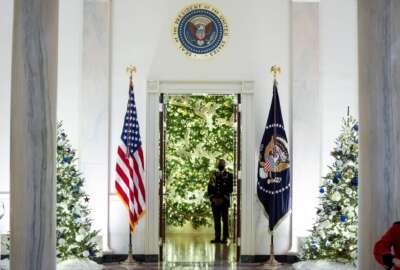New learning agenda may not be enough to actually improve agency performance
The Office of Management and Budget last week released what it called a learning agenda for federal agencies. It's the research they need to do to answer big...
Best listening experience is on Chrome, Firefox or Safari. Subscribe to Federal Drive’s daily audio interviews on Apple Podcasts or PodcastOne.
The Office of Management and Budget last week released what it called a learning agenda for federal agencies. It’s the research they need to do to answer big questions. The Federal Drive with Tom Temin spoke with someone who wonders whether the learning agenda actually gets to the root challenge of agency performance: Bob Tobias, professor in the Key Executive Leadership Program at American University.
Tom Temin: Bob, what was your reaction to the learning agenda?
Bob Tobias: I think a learning agenda is really a good approach. Because sometimes people are given a task and they jump right in, they don’t think about the real questions to get to the root cause of the problem. So theoretically, it’s great. But I think a good process does not necessarily guarantee a good result. And I think the learning agenda missed the most important critical question to achieving increased agency performance. And that is leadership development. We know, we all know that no matter what policies are created from this leadership agenda, it takes great leaders to implement those policies on a day-to-day basis. And it takes great leaders on a day-to-day basis to increase productivity. So for me, the most fundamental question is when we know great leadership is necessary to increase performance, the question should be why have agencies failed to invest in leadership development at every single level?
Tom Temin: Well, the learning agenda doesn’t really address that. I mean, it’s interesting talking to a professor about a learning agenda. And in developing leadership people through the courses at American University there, does the idea of a learning agenda for an organization come up? Maybe not in those terms; “learning agenda,” that’s kind of a new term of art, at least to me. How does learning figure in in the first place?
Bob Tobias: The question is leadership development is personal development. And it’s necessary for a leader to create an environment where those they lead are willing to give their discretionary energy to their boss, to accomplish their boss’s goals and objectives. And we know these kinds of leaders exist, but not enough of them exist. For example, as far back as 2008, the [Merit Systems Protection Board] proved the link between engaged employees and increased agency performance. And they said, quote, “The agencies with the highest employee engagement scores have the highest level of agency goal achievement, and those with the five lowest scores had the lowest goal achievement.” Now we know that we’ve known it for years, and yet agencies have failed to invest in leadership development.
Tom Temin: Well, the learning agenda, though, doesn’t really address that. That’s something separate. In other words, should you also have a learning agenda even as you have leadership development?
Bob Tobias: If the learning agenda had asked the question — which I suggest it should have — “Why have we failed to develop the leaders we need?” The answer to that question is, we would recognize that every leader doesn’t have the personal development necessary to exhibit empathy, or the vulnerability to say “I don’t know,” or the courage to provide negative feedback, or the ability to set clear goals and support their achievement, or the willingness to delegate and let those led fail, and then create a learning opportunity. Now that takes leadership development, and we know it, everybody knows it, but agencies don’t invest.
Tom Temin: Well, do you think that the leadership development is necessary in all agencies in order for the learning agenda to occur successfully?
Bob Tobias: That’s it. That is fundamentally it. And interestingly, in 2015, MSPB in a report titled, “Training and [Development] for the Senior Executive Service: A Necessary Investment,” said training and development can improve individual and organizational performance when properly designed, delivered and implemented. Thus, an investment in executive training and development can yield substantial returns in the form of higher performance. That’s it. That’s it: You have to invest in people in order to increase performance.
Tom Temin: And by MSPB, you’re referring to the Merit Systems Protection Board and the research that it does regularly into these issues. Well, I think we’ve seen some examples of that recently, when the Service to America Medals program came out. We saw the top Federal Employee of the Year — he retired a couple of months ago — was the person that took a 10 years late, billions-of-dollars-over-budget project, the James Webb Telescope, got it righted, and the thing launched successfully. And now we’re seeing the great pictures coming from it. But it took leadership of the same processes, the same people, the same program, switch leadership, and suddenly it was on the course to launch.
Bob Tobias: That’s a perfect, perfect example. If I don’t have collaboration skills, if I don’t have empathy skills, if I don’t have the ability to bring people together to engage people and to create that environment where people give their discretionary energy, I will fail. And he proved quite conclusively, that leadership made the difference.
Tom Temin: And by the way, we’re talking about [Greg] Robinson, who received that award. Do you recommend that agencies skip the learning agenda? I mean, they’re under obligation to actually carry it out, according to [the Office of Management and Budget]. How should they deal with it, given whatever leadership development capabilities and skills they have right now?
Bob Tobias: I don’t think they should skip that agenda. I think they should add this question to the agenda in order to achieve the other goals that are stated in the agenda. I just think it’s a question that was missed, that it was not included, and I think it should be included.
Tom Temin: All right. Well, from your lips to OMB ears. Bob Tobias is a professor in the key Executive Leadership Program at American University. Always good to get your thoughts.
Bob Tobias: Thank you very much, Tom.
Copyright © 2025 Federal News Network. All rights reserved. This website is not intended for users located within the European Economic Area.
Tom Temin is host of the Federal Drive and has been providing insight on federal technology and management issues for more than 30 years.
Follow @tteminWFED





